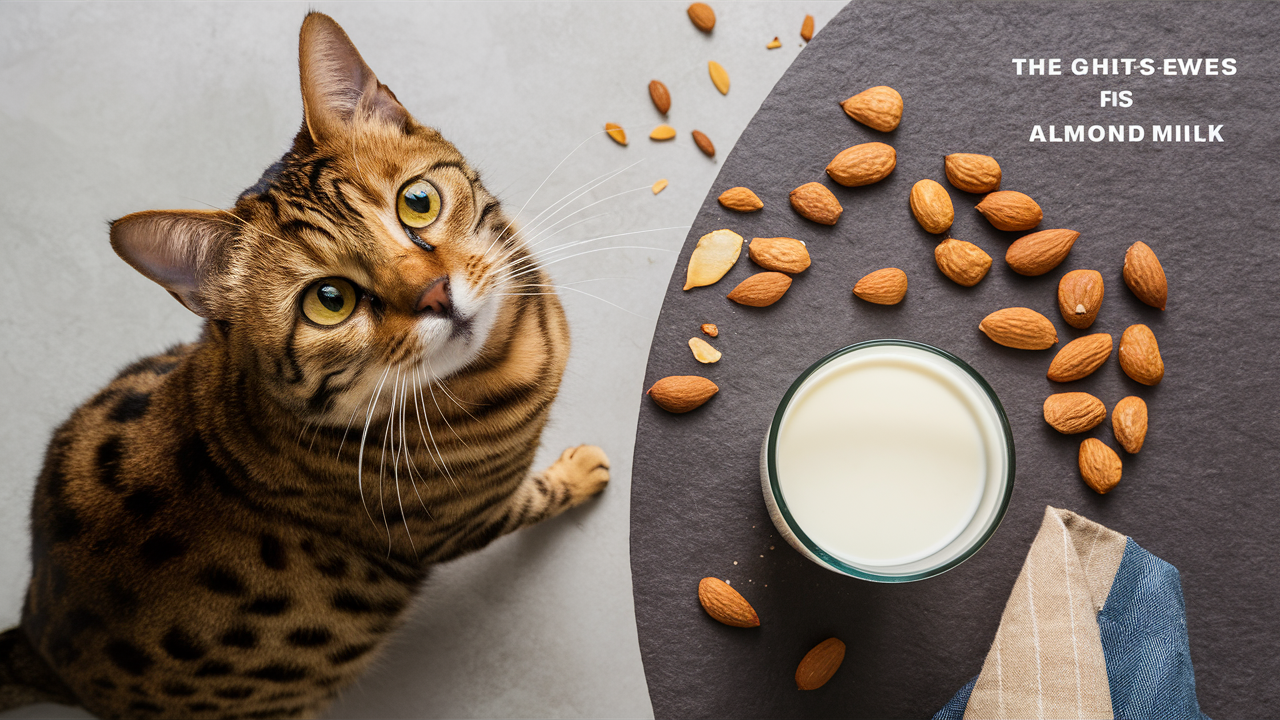Can cats have almond milk? This is a question that often pops up among cat owners who are looking for alternative milk options for their furry friends. Let’s Cat Safety Tips delve into the world of feline nutrition and explore the potential risks and benefits of giving cats almond milk.
Can cats have almond milk?
While there’s a common misconception that cats love milk, the truth is they can’t digest it like humans do. Cats don’t produce enough lactase, the enzyme needed to break down lactose, leading to lactose intolerance symptoms, often vomiting or diarrhea.
Can cats drink almond milk? For those cats who love milk but struggle with lactose, almond milk might seem like a promising alternative. However, this nut-based milk can be irritating to some sensitive stomachs. Almond milk should only be given to cats in moderation.

Is milk good for cats?
While cats might enjoy the taste of milk, it’s generally not good for them. Here’s why:
- Lactose Intolerance: Cats are lactose intolerant. They don’t produce enough lactase, the enzyme needed to break down lactose, the sugar found in milk. This leads to digestive upset, including diarrhea, vomiting, and gas.
- Nutritional Deficiency: Milk is not a complete source of nutrients for cats. It lacks essential nutrients like taurine, which is crucial for heart health and vision.
- Potential for Health Issues: Consuming milk regularly can contribute to long-term health problems like pancreatitis and urinary tract infections in cats.
What’s a better alternative?
Water is the best and safest drink for cats. If you want to give your cat a treat, a small amount of plain, unsweetened cow’s milk or goat’s milk is okay occasionally, but it’s best to stick to water for their daily hydration.
How much almond milk can cats have?
While almond milk might seem like a tempting treat for your feline friend, it’s important to remember that it’s not a necessary part of their diet. Their regular cat food provides all the nutrients they need.
If you do decide to offer a little almond milk as an occasional treat, start with a tiny amount, like a teaspoon, and observe your cat closely for any signs of digestive upset. If they tolerate it well, you can gradually increase the amount, but always keep it as a small treat and never replace their regular food with it.
Remember, the goal is to keep treats and supplemental foods below 10% of your cat’s total daily calorie intake to ensure a balanced diet and prevent any health problems.
Is there a better plant-based milk alternative?
While almond milk is popular, it’s not ideal for cats due to lactose intolerance and lack of essential nutrients. There isn’t a perfect plant-based milk alternative for cats, but here’s a breakdown of some options and why they’re not recommended:
- Soy Milk: Contains soy protein, which can be difficult for cats to digest and may cause allergies.
- Oat Milk: May contain added sugars and flavors that are not good for cats.
- Coconut Milk: Can cause digestive upset and is high in fat, which is not ideal for cats.
The Bottom Line:
- Water is the best and safest drink for cats.
- Avoid giving cats any type of milk, including plant-based alternatives.
- Focus on providing a balanced, high-quality commercial diet.
- If you’re concerned about your cat’s hydration or diet, consult your veterinarian. They can provide personalized advice based on your cat’s individual needs.
Is a vegan diet good for cats?
A vegan diet is not recommended for cats. Here’s why:
Essential Nutrients: Cats are obligate carnivores, meaning their bodies are designed to thrive on a diet primarily consisting of animal-based protein. They require specific nutrients found in meat, such as taurine, arachidonic acid, and vitamin A, which are crucial for their health and well-being. These nutrients are difficult or impossible to obtain in sufficient quantities from plant-based sources.
Health Risks: A vegan diet can lead to serious health problems in cats, including:
- Taurine Deficiency: Taurine is essential for heart health, vision, and reproduction. A lack of taurine can lead to heart problems, blindness, and reproductive issues.
Arachidonic Acid Deficiency: Arachidonic acid is important for skin and coat health, as well as brain function. A deficiency can lead to skin problems, hair loss, and cognitive decline. - Vitamin A Deficiency: Vitamin A is crucial for vision, immune function, and growth. A deficiency can lead to blindness, infections, and growth problems.
- Difficult to Balance: It’s extremely challenging to create a balanced vegan diet for cats that meets all their nutritional needs. This requires specialized knowledge and careful monitoring.
What’s the Best Diet for Cats?
A high-quality, balanced commercial diet that is specifically formulated for cats is the best way to ensure they get all the nutrients they need. These diets are carefully formulated to meet the specific nutritional requirements of cats.
Remember: If you have any concerns about your cat’s diet, always consult with your veterinarian. They can provide personalized advice based on your cat’s individual needs.
Notes When Giving Milk To Cats
No matter what type of milk you choose for your cat, remember:
- Give milk in moderation: Too much milk can cause digestive upset.
- Always check the ingredients of the milk: Make sure it doesn’t contain sugar, additives, or preservatives that are harmful to cats.
- Consult with your veterinarian: Your vet can advise you on the most suitable type of milk for your cat.
In conclusion
So, can cats have almond milk? While it might seem like a tasty treat, it’s best to stick to water and their regular cat food for their health. A balanced diet is key for their well-being, and almond milk isn’t a necessary part of it.

Related Post
Home Remedies For Lethargic Cat: Bring Back The Energy!
Is It Bad For Cats To Eat Dog Food? A Risky Choice
Can Cats Have Bread? The Truth About Feline Diets